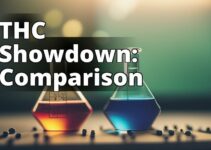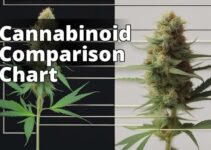Autism Spectrum Disorder (ASD) affects millions of individuals worldwide, causing significant challenges in social interaction, communication, and behavior. With no known cure, researchers have been exploring alternative treatment options to improve the lives of those impacted by autism. One such option that has been gaining attention recently is the use of cannabidiol (CBD) – a non-psychoactive compound found in cannabis plants.
In this article, we delve into the benefits of CBD for autism, how it may help manage symptoms, and what research has uncovered so far.
The Science Behind CBD and Autism
While there is still much to learn about the exact relationship between CBD and autism, studies suggest that the endocannabinoid system (ECS) plays a crucial role in regulating mood, anxiety, sleep, and other neurological functions. The ECS consists of receptors and neurotransmitters that interact with compounds like CBD to maintain balance within the body.
Research indicates that some individuals with autism may have an imbalance in their ECS, leading to increased anxiety, aggression, and sleep disturbances. By interacting with the ECS, CBD has the potential to restore balance and alleviate these symptoms. Furthermore, CBD's anti-inflammatory properties may help reduce inflammation in the brain that has been linked to autism.
Reducing Anxiety and Improving Social Interaction
Anxiety is a common trait among individuals with ASD, which often leads to difficulties in social situations. Several studies have looked at the effects of CBD on anxiety levels, finding promising results in both animal models and human trials.
One study conducted on children with ASD found that after 12 weeks of CBD treatment, anxiety levels were significantly reduced in more than 80% of the participants. This reduction in anxiety may, in turn, lead to improvements in social interactions and communication for those with autism.
Managing Aggression and Self-Injurious Behavior
Aggressive behavior and self-harm are often associated with ASD, causing significant distress for both individuals and their families. CBD has shown promise in managing these behaviors, as its interaction with the ECS can help regulate mood and reduce stress responses.
- In a 2019 study, over 60% of children with autism experienced a decrease in aggressive or self-injurious behavior after receiving CBD treatment.
- Another study found that after three months of CBD use, almost half of the participants exhibited reduced aggression and irritability.
While more research is needed, these findings suggest that CBD could be an effective tool in managing aggression and self-injury for individuals with autism.
Using CBD in Combination with THC Oil
THC (tetrahydrocannabinol) is the well-known psychoactive compound found in cannabis plants. While CBD alone has shown potential benefits for autism, some studies have explored the effects of combining CBD with THC oil in a controlled setting.
Reducing Seizures Associated with Autism
Epilepsy is commonly comorbid with autism – in fact, up to 30% of individuals with ASD also experience seizures. Research has demonstrated that CBD is effective in reducing seizure frequency and severity; however, some studies have found even greater success when using a combination of CBD and THC oil.
In one such study, participants who received a combination of CBD and THC experienced a significant reduction in seizure frequency compared to those who received only CBD. These results suggest that the combined compounds may offer enhanced benefits for individuals with autism and epilepsy.
Improving Sleep Quality
Sleep disturbances are a common issue for those with ASD, often leading to increased daytime irritability and reduced overall quality of life. While CBD has shown potential in improving sleep patterns, some studies have suggested that using a combination of CBD and THC oil may provide even greater benefits.
A 2018 study found that a combined treatment of CBD and THC oil led to improved sleep quality and duration for children with ASD. Additionally, the participants experienced a reduction in anxiety and improvements in communication skills.
Is Cannabidiol a Viable Treatment Option for Autism?
While research is still in its early stages, the evidence gathered thus far points to the potential benefits of using CBD – and in some cases, a combination of CBD and THC oil – to help manage symptoms associated with autism.
As with any alternative treatment option, it's essential to consult with a medical professional before incorporating CBD into an individual's care plan. It's also crucial to consider factors such as dosing, product quality, and potential interactions with other medications.
Ultimately, ongoing research will continue to shed light on the potential of cannabidiol for autism, offering hope for new avenues of treatment and improved quality of life for those affected by this complex disorder.





